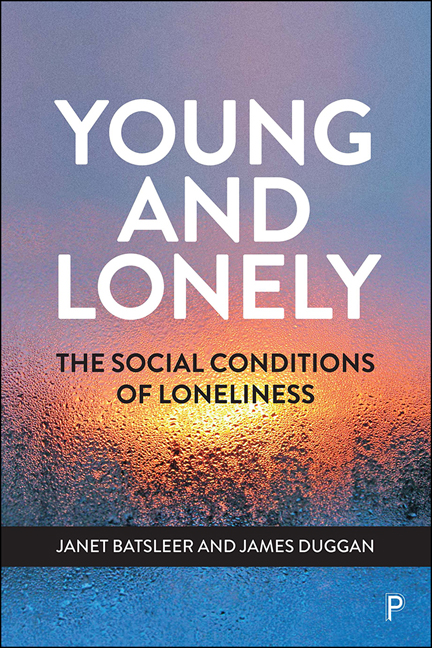Book contents
- Frontmatter
- Contents
- Notes on the Authors
- Acknowledgements
- Preface
- 1 Animate, Attune, Amplify
- 2 Finding Oneself a Loneliness Agenda
- 3 I’M New Here: Creating a New Research Project and A Young Person Led Research Agenda
- Part I The Social Conditions of Loneliness
- Part II The Experience of Loneliness
- Part III Building Friendship and Connection
- References
- Index
1 - Animate, Attune, Amplify
Published online by Cambridge University Press: 18 March 2021
- Frontmatter
- Contents
- Notes on the Authors
- Acknowledgements
- Preface
- 1 Animate, Attune, Amplify
- 2 Finding Oneself a Loneliness Agenda
- 3 I’M New Here: Creating a New Research Project and A Young Person Led Research Agenda
- Part I The Social Conditions of Loneliness
- Part II The Experience of Loneliness
- Part III Building Friendship and Connection
- References
- Index
Summary
This book reports and reflects on the Loneliness Connects Us youth co‑research project (2016–19). In 2016, the Co-op Foundation funded the project as the first significant participatory enquiry into youth loneliness. The aims of the research were to animate, attune to and amplify the insights of youth co-researchers on youth loneliness and then grow these conversations into a dialogue with an emerging national discussion on youth loneliness. This chapter outlines the theoretical and practice-based resources in which the research was grounded.
Loneliness and youth loneliness have been a focus for study across the millennia and academe, spanning the arts, philosophy, literature and poetry, politics, psychology, sociology, medicine and public health. There is not space here to review the various fields that contribute to better understanding loneliness in anything like sufficient detail. It is important to recognise that thus far the psychological research is incredibly influential in the youth loneliness agenda. Throughout the book we will engage with key insights from psychology but also identify limitations and biases for thinking about and intervening in young people's experience of loneliness. We do not think that any particular academic discipline or field of study holds dominium over the study of loneliness, and so we join calls for interdisciplinary research to better understand youth loneliness (Qualter et al, 2018).
In particular it is the participatory or co-produced turn to understand youth loneliness with and from the perspective of young people that poses exciting possibilities and troubling challenges for research in this subject. The shift to understanding loneliness from the perspective of young people is to acknowledge that ‘youth’ and ‘loneliness’ are categories that we apply to make sense of incredibly complex, emergent and social events and experiences. Youth loneliness relates our thinking to young people who are neither just lonely nor just young. We make the case for acknowledging that our lives are filled with meaning, riddled with shame and guilt, inspired by hope and imagination, and much richer and worthwhile for it.
It is by working with young people and developing our research as they reflect on their feelings of loneliness but also as they look at the communities and society they live in, the future they hope for or are afraid of, that an enquiry into, for example, the relationships with community and the intensity of loneliness emerges.
- Type
- Chapter
- Information
- Young and LonelyThe Social Conditions of Loneliness, pp. 1 - 10Publisher: Bristol University PressPrint publication year: 2020

